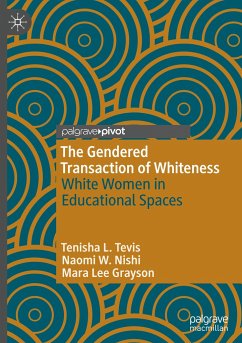
Whiteness and Class in Education
Versandkostenfrei!
Versandfertig in 6-10 Tagen
76,99 €
inkl. MwSt.
Weitere Ausgaben:

PAYBACK Punkte
38 °P sammeln!
Like many of my friends I didn't really realise that I was working class until I went to university. Suddenly, what I thought as normal became subtly and not so subtly differentiated as I came into close contact with the middle classes. I had not known a time, though, when I hadn't been white, but I didn't really realise that I was white until I read David Roediger's (1991) book 'The Wages of Whiteness'. Through reading this work and others on the topic of whiteness the sense of my own whiteness became palpable to me. Namely, that what I naively thought to be a timeless property of my skin was...
Like many of my friends I didn't really realise that I was working class until I went to university. Suddenly, what I thought as normal became subtly and not so subtly differentiated as I came into close contact with the middle classes. I had not known a time, though, when I hadn't been white, but I didn't really realise that I was white until I read David Roediger's (1991) book 'The Wages of Whiteness'. Through reading this work and others on the topic of whiteness the sense of my own whiteness became palpable to me. Namely, that what I naively thought to be a timeless property of my skin was a social construction that had acquired so much symbolic weight over time that it had become seemingly real: a racial formation and project. This was with consequences, in that a good part of my actual and psychological labour market and other employment benefits were not part of a meritocratic system, but due to the oppression of people of colour. This might be part of a system that I at the time associated only with the far-right, a system of white supremacy. Fundamentally, my skin was property and the gains that I had made through it were at the expense of others. I was a 'so called white' (Ignatiev and Garvey, 1996) who everyday made a political decision to not commit 'treason' to whiteness.














